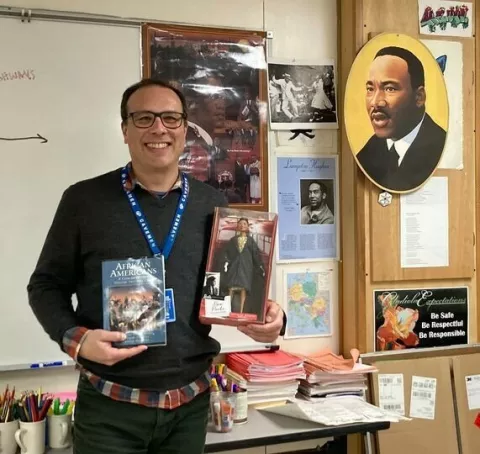
District/College: Grants Pass School District
Job Assignment/Position: General Education Teacher, Gladiola High
Local Association: Grants Pass Education Association (GPEA)
Years of Educator Experience: I don’t count these things. I started in 1998. Years. Plural.
What are three ways you have actively elevated equity?
- I feel like my entire teaching career is rooted and sustained by personalized, multi-cultural, and socially-conscious curriculum . Every day. I was lucky to have started teaching at Portland Public Schools, riding a wave of multiculturalism: Black studies, Native American voices, Hispanic texts. Since then, I have taught at over eight high schools in the Northwest, some big, some small. I am always looking to insert multi-cultural lenses into English courses and history courses. Because if you take away everything else: the culture wars, the politics, weak administrations, and angry parents… you are left with you and your student. The relationship. The connection. The communication.
- I am currently teaching my favorite course: African American Studies in a very conservative and rural Oregon. Changing the minds of children is not really that hard, but it takes perseverance and time and trust. One child at a time. That’s how equity is spread: one to one, at the very basic, human level. All my students understand that I protect and advocate for LGBTQ students, Black students, Tribal students (a label my indigenous students on an ex-reservation called each other), unhoused students, and special education students. I don't have to put up any signs saying my room is a safe place. My words and my behavior make it safe, every single day.
- I am a member of OEA’s BIPOC educators and a member of OEA’s Racial Equality Committee (CORE). I contribute to BIPOC educator groups around the state. I participate and I show up. It’s important to spread our voices in a state that has had a history of excluding BIPOC people. Very important. But also, what I am doing shouldn’t be that special. It should just be… everywhere and understood.
What is your equity stance?
Don’t take this the wrong way, but I don’t like how Equity is a “thing”. I don’t like that we have to stand up for it. In an ideal world, Equity is logical. Equity is profitable. Equity is front-and-center. Equity is business-as-usual. Equity is prevalent. Equity is understood by all.
But that is not the world we live in, so Equity is a thing. In a world that values money above homelessness, “like”s above mental health, guns above human loss, and white supremacy as the status quo, it’s imperative that Equity be something everyone fights for, recognizes, and advocates for. Equity should be heard in meetings, in hallway conversations, in discipline meetings, in our interactions with students, and above all, in our curriculum. Equity is only made complex by our complex goals in today’s society. Too much noise will complicate basic compassion for fellow humans, and love for each other. Equity, to me is the hard-working soldier of the fight for love.
If we were to talk, I’d tell you that there has been a tremendous shift in Equity from when I first began teaching. I felt like inequitable practices in all sorts of areas in the world have prevailed. We need to right what has been wronged. If you ask, I’ll tell you that African Americans need investments (yes, real investments of millions of dollars) in the education, health, and growth of Black young men and women. Stop the incarceration crisis of young Black men now. Take care of Indigenous populations with investments of infrastructure and sustained health care for Indigenous communities. I could go on…
Yes, we could talk for a long time about real Equity. And not some lip service. We’ve come too far not to see what needs to be done now. Because it is important for everyone.
What is your favorite social justice quote?
Not everything that is faced can be changed, but nothing can be changed until it is faced
James Baldwin, 1962
James Baldwin has always been my favorite quote maker. Read The Fire Next Time or short stories like Looking for the Man. To me, he’s the premier thinker, and Harlem’s greatest.
Can you share one equity focused resource or student read that you recommend?
-
Oregon's Black History Timeline by Walidah Imarisha